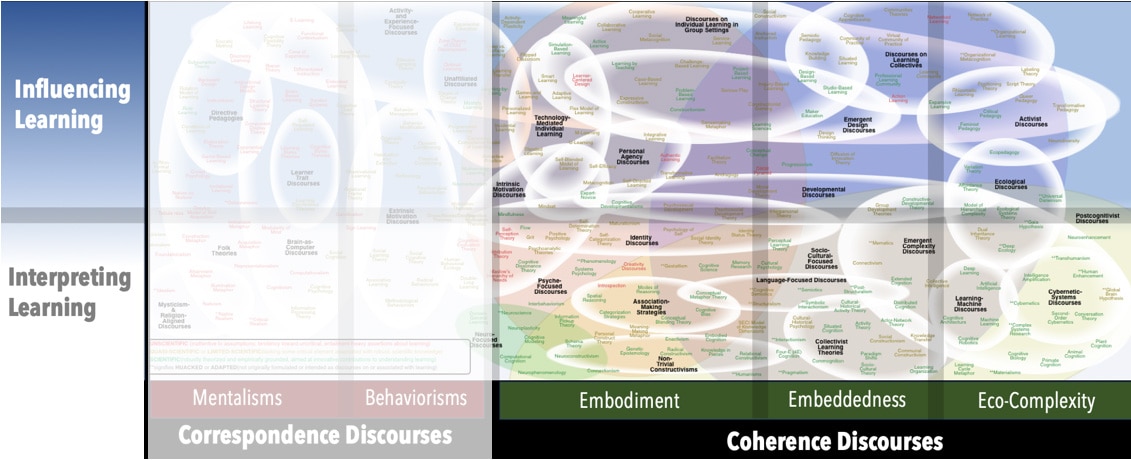AKA
Coherentist Theories of Epistemic Justification
Coherence Theories of Truth
Coherentism
Focus
Understanding truths as necessary elements of a systematically coherent wholePrincipal Metaphors
- Knowledge is … ecosystem of interdependent forms
- Knowing is … doing, being
- Learner is … an evolving coherence
- Learning is … adapting, becoming
- Teaching is … coupled engagement
Originated
Ancient, but only over the past few centuries as a prominent movementSynopsis
Coherence Discourses are perspectives on learning that regard distinctions and descriptions as useful devices to make sense of the complex dynamics of learning, but it cautions that such devices are mere heuristic conveniences. Truths are not cast in terms of correspondences (e.g., between theories and actuality, or between subjective models and objective reality), but as coherences – that is, propositions that are part of a system, elements that contribute to and rely on a larger whole, interpretations that constitute a consistent, extensive body. In this frame, a statement is true to the extent that it is a viable element of a systemically coherent whole. In other words, Coherence Discourses suggest that truths do not exist independently or outside of a system – which is a commentary on humans’ understanding of reality, not a commentary on reality. Most Coherence Discourses employ biological and ecological metaphors, with dynamics framed in evolutionary terms and relationships framed in the vocabulary of couplings, complementarities, and nestings. Learning is typically interpreted as a continuous, iterative process. Associated discourses include:- New Sciences (~1980s) – a broad scientific movement collecting around two key principles: (1) It is oriented by a logic of coherence or viability, whereby truth is understood in terms of utility of explanation within a system of interpretation (vs. the modernist logic of correspondence, whereby truth is understood in terms of some sort of match with an assumed-to-be pregiven reality). (2) The observer is understood to be complicit in the observation (vs. the common-but-nonsensical assumption that there can be observerless observations).
- Non-Representationalisms – an umbrella term that can be applied to any discourse that rejects the assumption that learning has to do with constructing an internal representation of an external reality. Non-Representationalisms tend to interpret learning in terms of one’s ongoing efforts to maintain fitness within ever-evolving circumstances. (Compare: Representationalism.)
- Attunement (J.J. Gibson, 1960s) – a metaphor proposed as an alternative to the Correspondence Discourses suggestion learning involves some sort of internalization of an external reality. The metaphor of Attunement brings together such notions of responsiveness, fitness, mutual affect, co-determination.
- Processism (Ontology of Becoming; Process Philosophy) (Alfred North Whitehead, 1920s) – Directly contrary to the object-focus of most Correspondence Discourses, Processism positions dynamics (e.g., changing relationships, evolving circumstances, transient events) as the true loci of reality.
- Resonance – a metaphor proposed as an alternative to the Correspondence Discourses suggestion learning involves some sort of internalization of an external reality. The metaphor of Resonance highlights such notions as dynamic co-emergence and structural coupling (see Enactivism).
- Coherence – in Psychology, meaningful and consistent associations among the elements of one’s mental world, including beliefs, ethical principles, and formal knowledge
- Integration – a concept that is common across a range of contexts and topics in Psychology, generally used to signal processes of coordination, achievements of unified functioning, and/or absences of conflict/dissonance (e.g., among one’s motivations and one’s actions, or between a collective’s stated identifications and its members’ convictions)
- Fragmentation – among Coherence Discourses, any disruption that compromises the unity or flow of a thought, personality, or other complex phenomenon. Related constructs include:
-
- Cognitive Slippage (Paul Everett Meehl, 1970s) – a mild, and usually quite temporary, form of Fragmentation
- Disintegration – the interruption or rupture of a structure that is necessary to a system’s fluid functioning
- Disorganization – the disruption of coherent structure and/or activity – of thought or behavior
- Loosening of Associations (Cognitive Derailment; Derailment; Thought Derailment) – abrupt breaks in the flow of thought, such that one idea does not follow from whatever preceded it
- Personality Disintegration – a Fragmentation of one’s personality so extreme that one no longer presents coherent or continuous beliefs or traits
Commentary
The reasonableness of the notion of Coherence Discourses (as contrasted with (Correspondence Discourses) has been debated for well over a century, especially among philosophers and mathematicians. There is no consensus, but opinion has evolved toward Coherence Discourses across most domains.Subdiscourses:
- Attunement
- Cognitive Slippage
- Coherence
- Disintegration
- Disorganization
- Fragmentation
- Integration
- Loosening of Associations (Cognitive Derailment; Derailment; Thought Derailment)
- New Sciences
- Non-Representationalisms
- Personality Disintegration
- Processism (Ontology of Becoming; Process Philosophy)
- Resonance
Map Location

Please cite this article as:
Davis, B., & Francis, K. (2023). “Coherence Discourses” in Discourses on Learning in Education. https://learningdiscourses.com.
⇦ Back to Map
⇦ Back to List
